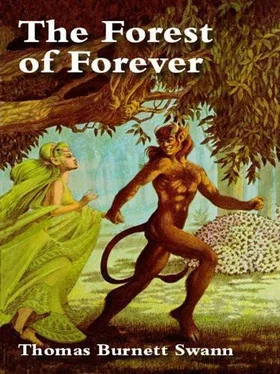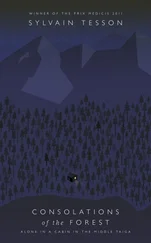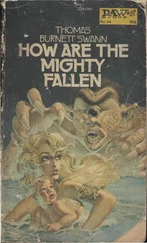Thomas Swann - The forest of forever
Здесь есть возможность читать онлайн «Thomas Swann - The forest of forever» весь текст электронной книги совершенно бесплатно (целиком полную версию без сокращений). В некоторых случаях можно слушать аудио, скачать через торрент в формате fb2 и присутствует краткое содержание. Жанр: Фэнтези, на английском языке. Описание произведения, (предисловие) а так же отзывы посетителей доступны на портале библиотеки ЛибКат.
- Название:The forest of forever
- Автор:
- Жанр:
- Год:неизвестен
- ISBN:нет данных
- Рейтинг книги:3 / 5. Голосов: 1
-
Избранное:Добавить в избранное
- Отзывы:
-
Ваша оценка:
- 60
- 1
- 2
- 3
- 4
- 5
The forest of forever: краткое содержание, описание и аннотация
Предлагаем к чтению аннотацию, описание, краткое содержание или предисловие (зависит от того, что написал сам автор книги «The forest of forever»). Если вы не нашли необходимую информацию о книге — напишите в комментариях, мы постараемся отыскать её.
The forest of forever — читать онлайн бесплатно полную книгу (весь текст) целиком
Ниже представлен текст книги, разбитый по страницам. Система сохранения места последней прочитанной страницы, позволяет с удобством читать онлайн бесплатно книгу «The forest of forever», без необходимости каждый раз заново искать на чём Вы остановились. Поставьте закладку, и сможете в любой момент перейти на страницу, на которой закончили чтение.
Интервал:
Закладка:
I dare not call it a happy time, while childless Kora waited in the Country of the Beasts, her strained white face a spectre in our minds. But the plans, the risk, the hope-and hope seemed almost a certainty while we were on the move-bound us together with the comradeship of soldiers sharing danger, and also with the tenderness only possible between a boy and a woman who might have been his mother (or except accident of years, his beloved).
The morning of the fourth day, Knossos spread incredibly below us.
“Eunostos,” I called down to him. “We’re there. But we mustn’t be seen together. When we reach the marketplace, I’ll leave the cart. Give me a few minutes before you show yourself. Then you know what to do.”
His head erupted from the straw. “It’s like a rainbow fallen out of the sky!”
I submerged the head and the incriminating horns. “Not yet, simpleton. But yes, it is, and it looks as if it might return to the clouds at any minute.” I blinked my eyes. It was not a city, it was witchery, and at such a time I could not afford to be bewitched. As an antidote to sheer, open-mouthed wonderment, I reminded myself that, according to my Cretan lover, the Egyptians did not approve of Knossos. Streets which meandered when they ought to advance. End beams projecting from houses as if the builders had forgotten them and wandered off to make love. Flat roofs unexpectedly bulging into impertinent attics. Story built upon story like so many afterthoughts. Little blue huts side by side with scarlet villas. Sprawling apartments whose windows were filled with fiery orange parchment. Such a riot of colors-garishness, said the Egyptians. Where was the dignity of grays and browns, of sand colors, pyramid colors? Such a want of planning. Wastefulness, said the Egyptians. Where was the grandeur of temples with pylon gates and obelisks as straight as the shaft of a spear?
But the Cretans laughed and made no excuses for their fallen rainbow. “You say we squander our colors. Look at a field in spring. Do the flowers offend your eyes, whatever hues they mingle? You say we build crookedly. Look at the forest. Do the trees grow in rows? Do the branches make perfect spheres above their trunks? Beside, we did not build our city, Zeus built it. When he was a little boy, the Great Mother said to him, ‘You’re restless, my son, on the mountaintop. Descend into the valley and build me a town to delight my heart.’ And the child took stone from the mountain, clay from the banks of a stream, wood from the fir tree; and he snatched a whole rainbow right out of the sky and went into the valley without a plan in his quick little brain, but with a vision, and built his town in a single morning. And the Great Mother said, ‘But the streets are crooked.’ And the child answered, ‘So is a stream,’ and his mother smiled.”
“Zoe, I thought we were almost there. I’m about to sneeze.”
“We are I said, prodding the ox, who had finally learned to obey my commands. “I was just catching my breath. But now to practical matters.”
Knossos alone among the great cities of Men was totally unfortified; its walls were its bull-prowed ships. But though there were neither forts nor gates nor even guards, except for the palace garrison, it was understood that farmers would not enter the city with their carts, or warriors with their chariots. The farmers marketed their grapes, olive oil, melons-whatever the season’s crop-in a large open field flanked by vineyards and olive groves, or walked into the city to make purchases in the canvas-covered stalls, which fluttered like big butterflies, or in the arcades of shops, whose bare-breasted proprietresses were as pert and impudent as their pottery and figurines. In the absence of the farmers, no one bothered their carts, for theft belonged to the countryside, not to Knossos. It was not a virtuous city by any means: its consumption of beer and wine was legendary, its sexual practices imaginative and prodigious; but its sins (said the Egyptians), or rather its pleasures (said the Knossians), lay in partaking, not in taking. As they approached the city, the peasants somehow forgot their wariness and relaxed in a beneficent glow of brotherly and other kinds of love. Oh, they would bargain and haggle over a price, raise their voices even scowl on occasion-but to steal in Knossos? Unthinkable. There were no watchdogs, or dogs of any kind, only Egyptian cats, snoozing on rooftops or walking the clean unlittered streets as if they felt no yearning for their original homeland. For cats, like Cretans, abhor rules.
Great ladies and gentlemen traveled the meandering roads in sedan chairs carried by servants or slaves, but everyone else walked, for it was not a vast metropolis, like Babylon, but a relatively small city with small buildings for small people, and unwieldy wagons or clattering chariots were as unthinkable as elephants in a vineyard.
I had parked the wagon at the edge of the field, in the shade of an olive tree, since poor Eunostos must be roasting under his straw blanket.
“I’m going now, Eunostos,” I whispered, standing by the ox as if I were talking to him like a farmer who dotes on his animal. No one was close enough to catch my exact words. “But I’ll be watching you from a distance. Once you enter the palace, I’ll go to the agreed spot and wait till lamp-lighting time. If you don’t come, I’ll assume they have captured you and do what I can to set you free. If you do come-”
“It will be with the children. Or else the children will come without me. And if they do, you must get them right back to the country and not try to rescue me. Promise, Zoe?”
I promised but whispered under my breath, “Mother Goddess, I didn’t promise by you.”
I sauntered casually away from the cart and mingled with a group of peasants, nodding and smiling but careful not to speak and betray my Bestial accent. Everybody else seemed to be talking, buyers to sellers, sellers to buyers. But suddenly the talk began to subside and then there was not a sound in all that crowd. It was like the wind leaving a field of barley and letting the stalks ripple into silence. Eunostos had climbed from the cart. I watched him as he shook himself free of the straw and started for the cobbled road which led through the field and directly to the palace. They won’t harm him here in the shadow of the city, I thought, not even the superstitious country folk. Still, they will fear him and some will make sport of him.
I was mistaken. They stared with awe rather than fear at this seven-foot, horned, tailed demon who had materialized-from a cart, was it? More likely from the air! They did not throw rocks, they did not ridicule, they parted to let him pass, as if it were his city to which they had come, and where they remained by his sufferance. Perhaps because of his boldness-perhaps because he somehow glowed with divinity-they took him for a god instead of a demon. Now he had reached the road to the palace. Now he was overtaking peasants bound for audience with the king, and meeting ladies and gentlemen bound in the opposite direction for the market place. Voices lilted from curtained sedan chairs, the bearers halted, the curtains opened, and bare-breasted ladies dangled out of the windows. Children gathered on rooftops, pointing, gesticulating, but not ridiculing, and a small boy cried in a high, sweet voice.
“Mama, is it a Minotaur?”
“Yes, son. It may be the last Minotaur.”
“Has he come to hurt us?”
“I think this one has come to bring us luck. You see, he is like the god we worship. The same noble horns!”
Looking straight ahead of him, never stumbling, holding himself at his full height, his red mane a splendor of silk and sun, his horns like potent but unthreatening weapons, Eunostos entered the stepped portico of the palace and mounted toward the gate. He did not need a forest to give him dignity. He brought the forest with him and walked in the courage of his purpose. Guards advanced to meet him, not to capture but to escort, and together they vanished between the red, down-tapering columns and into the palace of Minos and his brother Aeacus and the royal children, Thea and Icarus.
Читать дальшеИнтервал:
Закладка:
Похожие книги на «The forest of forever»
Представляем Вашему вниманию похожие книги на «The forest of forever» списком для выбора. Мы отобрали схожую по названию и смыслу литературу в надежде предоставить читателям больше вариантов отыскать новые, интересные, ещё непрочитанные произведения.
Обсуждение, отзывы о книге «The forest of forever» и просто собственные мнения читателей. Оставьте ваши комментарии, напишите, что Вы думаете о произведении, его смысле или главных героях. Укажите что конкретно понравилось, а что нет, и почему Вы так считаете.










